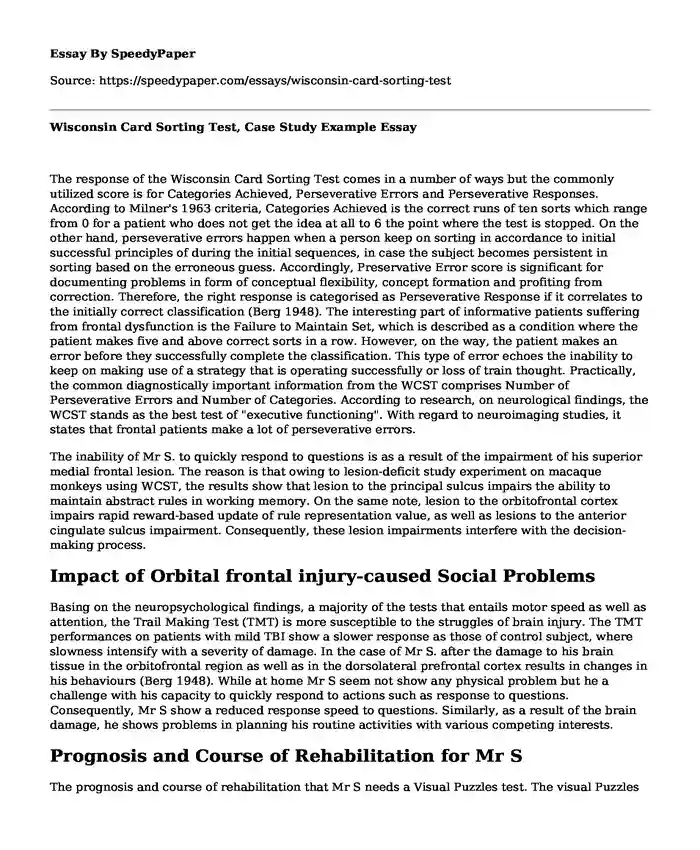The response of the Wisconsin Card Sorting Test comes in a number of ways but the commonly utilized score is for Categories Achieved, Perseverative Errors and Perseverative Responses. According to Milner's 1963 criteria, Categories Achieved is the correct runs of ten sorts which range from 0 for a patient who does not get the idea at all to 6 the point where the test is stopped. On the other hand, perseverative errors happen when a person keep on sorting in accordance to initial successful principles of during the initial sequences, in case the subject becomes persistent in sorting based on the erroneous guess. Accordingly, Preservative Error score is significant for documenting problems in form of conceptual flexibility, concept formation and profiting from correction. Therefore, the right response is categorised as Perseverative Response if it correlates to the initially correct classification (Berg 1948). The interesting part of informative patients suffering from frontal dysfunction is the Failure to Maintain Set, which is described as a condition where the patient makes five and above correct sorts in a row. However, on the way, the patient makes an error before they successfully complete the classification. This type of error echoes the inability to keep on making use of a strategy that is operating successfully or loss of train thought. Practically, the common diagnostically important information from the WCST comprises Number of Perseverative Errors and Number of Categories. According to research, on neurological findings, the WCST stands as the best test of "executive functioning". With regard to neuroimaging studies, it states that frontal patients make a lot of perseverative errors.
The inability of Mr S. to quickly respond to questions is as a result of the impairment of his superior medial frontal lesion. The reason is that owing to lesion-deficit study experiment on macaque monkeys using WCST, the results show that lesion to the principal sulcus impairs the ability to maintain abstract rules in working memory. On the same note, lesion to the orbitofrontal cortex impairs rapid reward-based update of rule representation value, as well as lesions to the anterior cingulate sulcus impairment. Consequently, these lesion impairments interfere with the decision-making process.
Impact of Orbital frontal injury-caused Social Problems
Basing on the neuropsychological findings, a majority of the tests that entails motor speed as well as attention, the Trail Making Test (TMT) is more susceptible to the struggles of brain injury. The TMT performances on patients with mild TBI show a slower response as those of control subject, where slowness intensify with a severity of damage. In the case of Mr S. after the damage to his brain tissue in the orbitofrontal region as well as in the dorsolateral prefrontal cortex results in changes in his behaviours (Berg 1948). While at home Mr S seem not show any physical problem but he a challenge with his capacity to quickly respond to actions such as response to questions. Consequently, Mr S show a reduced response speed to questions. Similarly, as a result of the brain damage, he shows problems in planning his routine activities with various competing interests.
Prognosis and Course of Rehabilitation for Mr S
The prognosis and course of rehabilitation that Mr S needs a Visual Puzzles test. The visual Puzzles test entails that subjects view a completed puzzle and after that pick three response options that when combined are able to reconstruct the Puzzle. It is used to measure non-verbal reasoning and the capacity to analyse and synthesize abstract visual stimuli without motor demands.
References
Berg E.A., G. H. (1948). Wisconsin Card Sorting Test. 636-654.
Cite this page
Wisconsin Card Sorting Test, Case Study Example. (2022, May 24). Retrieved from https://speedypaper.com/essays/wisconsin-card-sorting-test
Request Removal
If you are the original author of this essay and no longer wish to have it published on the SpeedyPaper website, please click below to request its removal:
- Free Essay on Strategic Management and Strategic Competitiveness in Exelon Corporation
- Essay Sample with Analysis of Business and Financial Performance of Burberry
- Free Essay on Puma Company and Social Media Marketing
- Free Essay with Two Websites Analysis
- Introduction to Composition
- Free Essay: History Significance
- Free Essay Example - Ncaa Paying College Athletes
Popular categories





